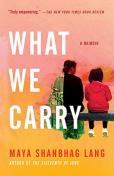BKMT READING GUIDES
What We Carry: A Memoir
by Maya Shanbhag Lang
Paperback : 304 pages
4 clubs reading this now
1 member has read this book
If our family stories shape us, what happens when we learn those stories were never true? Who do we become when ...
Introduction
“A gorgeous memoir about mothers, daughters, and the tenacity of the love that grows between what is said and what is left unspoken.”—Mira Jacob, author of Good Talk
If our family stories shape us, what happens when we learn those stories were never true? Who do we become when we shed our illusions about the past?
Maya Shanbhag Lang grew up idolizing her brilliant mother, an accomplished physician who immigrated to the United States from India and completed her residency all while raising her children and keeping a traditional Indian home. Maya’s mother had always been a source of support—until Maya became a mother herself. Then the parent who had once been so capable and attentive became suddenly and inexplicably unavailable. Struggling to understand this abrupt change while raising her own young child, Maya searches for answers and soon learns that her mother is living with Alzheimer’s.
Unable to remember or keep track of the stories she once told her daughter—stories about her life in India, why she immigrated, and her experience of motherhood—Maya’s mother divulges secrets about her past that force Maya to reexamine their relationship. It becomes clear that Maya never really knew her mother, despite their close bond. Absorbing, moving, and raw, What We Carry is a memoir about mothers and daughters, lies and truths, receiving and giving care, and how we cannot grow up until we fully understand the people who raised us. It is a beautiful examination of the weight we shoulder as women and an exploration of how to finally set our burdens down.
Praise for What We Carry
"Part self-discovery, part family history. . . [Lang's] analysis of the shifting roles of mothers and daughters, particularly through the lens of immigration, help[s] to challenge her family’s mythology. . . . Readers interested in examining their own family stories . . . will connect deeply with Lang’s beautiful memoir."—Library Journal (Starred Review)
“A stirring memoir exploring the fraught relationships between mothers and daughters . . . astutely written and intense . . . [What We Carry] will strike a chord with readers.”—Publishers Weekly
“Lang is an immediately affable and honest narrator who offers an intriguing blend of revelatory personal history and touching insight.”—BookPage
Editorial Review
No Editorial Review Currently AvailableExcerpt
Prologue“Mayudi, I want to tell you a story,” my mother told me.?My daughter was nine days old. Overwhelmed by the new demands of motherhood, I had turned to my mom for support. I wanted her to listen in her sympathetic way, to take up my feelings, to murmur in agreement as she did. Always, after talk- ...
Discussion Questions
“Maybe at our most maternal, we aren’t mothers at all,” Lang writes. “We’re daughters, reaching back in time for the mothers we wish we’d had and then finding ourselves.” What does she mean by this? Can you think of examples—from your own life or someone else’s—that show how this is true?When we first encounter the story of the woman in the river, Lang expects it to be about maternal sacrifice. She is surprised when her mother says, “We must not judge. That is the real lesson of the story. Whatever a woman decides, it is not easy.” How do Maya’s judgments of herself and her mother change over the course of the book? Have you ever found yourself judging yourself or someone else differently over time??
As she settles into motherhood, Maya begins writing a novel. This is her form of self-care. “Only in my writing am I able to let go,” she writes. “Perhaps this is what we should give new moms: A laptop and a cup of coffee. A notebook and a pen. Permission to dream.” What messages do you think our culture sends to mothers about the value of caring for themselves? What methods of self-care are condoned or disparaged? What feels like true self-care to you?
“There is a certain dark point at which self-sufficiency becomes a dare,” Lang writes. “Why ask for help when you can pretend not to need it?” Why is asking for help difficult? How do you feel when you ask for help?
As Maya struggles to understand the idea of home, Zoe tells her, “Home is the place that’s always open.” Maya realizes that her mother made her feel most at home in the world. How would you define home? Is there someone or something that helps you feel like you have a place in the world?
Book Club Recommendations
Recommended to book clubs by 0 of 0 members.
Book Club HQ to over 90,000+ book clubs and ready to welcome yours.
Get free weekly updates on top club picks, book giveaways, author events and more








